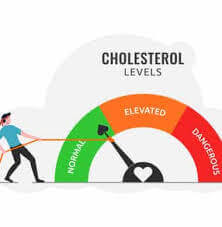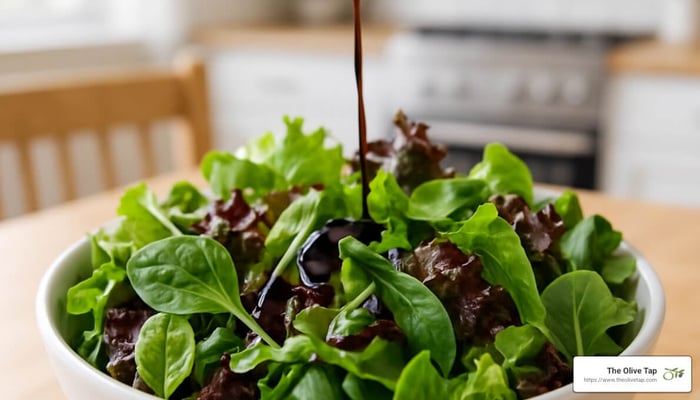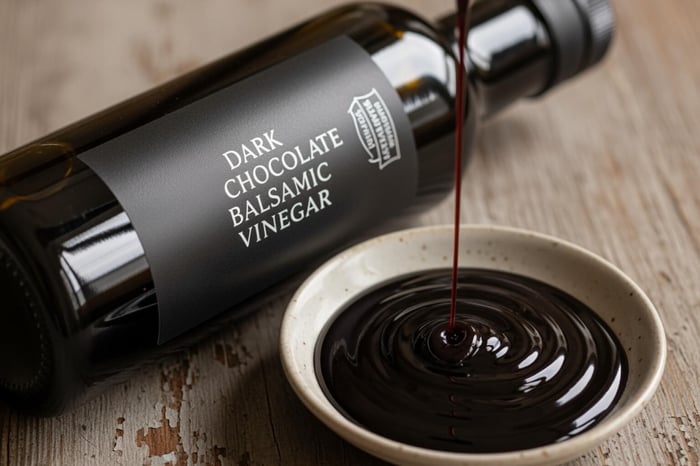Our Blog

Is Balsamic Vinegar Healthy? Here's the Tangy Truth
The Tangy Truth: Is Balsamic Vinegar Good For You?
When it comes to condiments that actually contribute to your well-being, balsamic vinegar's healthy benefits stand in a league of their own. This isn't just kitchen folklore – science backs up what Italian grandmothers have known for generations. This rich, dark elixir brings complex flavor to your plate while supporting your body in remarkable ways.
Let's cut to the chase – here's what makes balsamic vinegar a health superstar:
| Health Benefit | How Balsamic Vinegar Helps |
|---|---|
| Heart Health | Contains polyphenols that may lower LDL cholesterol and improve circulation |
| Blood Sugar | May create a blood sugar plateau for up to 5 hours after meals |
| Weight Management | Provides flavor with only ~14 calories per tablespoon |
| Digestion | Contains probiotic compounds that support gut health |
| Antioxidant Protection | Rich in polyphenols that fight free radicals |
Deep in Italy's Modena region, balsamic vinegar has been crafted and treasured for centuries. It's not just the complex flavor that's earned this condiment its revered status – it's the remarkable health benefits that come with each drop. Traditional balsamic starts with reduced grape must, then undergoes a patient aging process in wooden barrels. This careful method concentrates antioxidants, minerals, and acetic acid – the trio responsible for its health-boosting properties.
Unlike those creamy dressings that pile on empty calories, balsamic vinegar's healthy options add depth and character to your meals while supporting your wellness goals. With a mere 14 calories per tablespoon, zero fat, and barely a trace of sodium, it's a flavor powerhouse that won't derail your healthy eating plans.
Hippocrates, the father of medicine, once prescribed a simple vinegar and honey mixture for various ailments. Turns out he was onto something! Modern research now confirms what traditional wisdom suggested – the compounds in balsamic vinegar can support everything from heart function to digestive health.
One important note: not all bottles deliver equal benefits. The most pronounced health advantages come from authentic, aged varieties containing only grape must and wine vinegar. Skip the commercial options with added sugars, thickeners, and caramel coloring if you're seeking maximum wellness benefits.
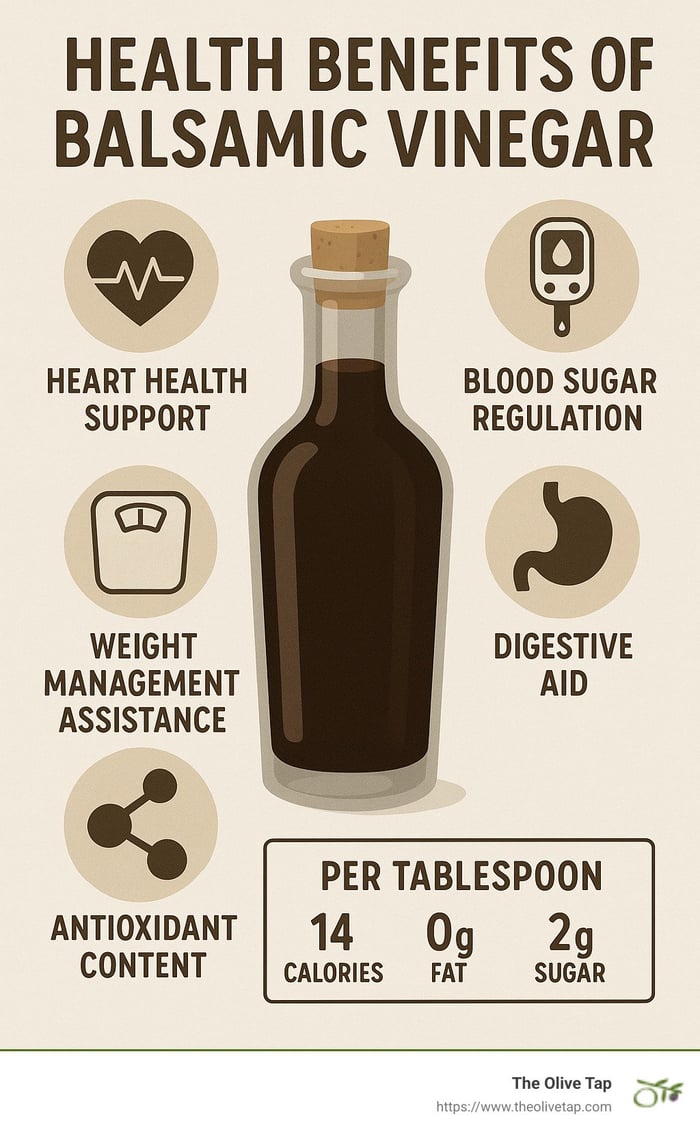
Is Balsamic Vinegar Healthy? Nutritional Snapshot
Let's peek inside that dark, syrupy bottle that's likely sitting in your pantry right now. What makes balsamic vinegar healthy beyond its rich flavor? According to USDA data, a single tablespoon (16g) gives you quite the nutritional bang for your buck:
A tablespoon contains just 14 calories, 3g carbohydrates, and 2g of natural sugar – all with absolutely no fat. You'll also find minimal sodium (4mg) alongside 18mg of potassium and 4mg of calcium, plus trace amounts of iron, magnesium, and phosphorus. (these numbers do vary based on the specific balsamic vinegar).
The real star of the show is the acetic acid content – approximately 6% – which is actually slightly higher than what you'd find in distilled or apple cider vinegar. This humble acid is responsible for many of the health benefits we'll explore together.
But that's not all! During the aging process in wooden barrels, something magical happens. The polyphenols from grapes – powerful antioxidants like quercetin, gallic acid, and ellagic acid – become more concentrated, creating a flavor symphony that also supports your health.
Why is balsamic vinegar healthy for everyday diets?
Think of balsamic vinegar as your taste buds' best friend and your waistline's ally. At just 14 calories per tablespoon, it adds tremendous depth of flavor where creamy dressings would cost you 70-100 calories for the same amount. That's flavor math that makes sense!
For those watching their sodium intake, balsamic vinegar is remarkably low at just 4mg per tablespoon. This makes it a heart-friendly choice for adding zest to your meals without the salt.
What's particularly impressive is the antioxidant density. The traditional aging process doesn't just develop flavor – it concentrates those beneficial polyphenols, giving you more antioxidant power per calorie than many other condiments.
And let's not forget how wonderfully versatile it is! From brightening up a simple salad to changing a bowl of fresh strawberries into a sophisticated dessert, balsamic vinegar makes healthy eating genuinely enjoyable.
How balsamic vinegar healthy claims are studied
When we talk about the health benefits of balsamic vinegar, it's worth noting where the evidence comes from. Many studies focus on vinegar generally, rather than balsamic specifically. Some research relies on our furry friends in animal models rather than human trials, and the human studies often use smaller sample sizes than we'd ideally like to see.
As registered dietitian Erin Palinski-Wade points out, "Balsamic vinegar, like other types of vinegar, is thought to limit spikes in blood glucose levels after meals, which may be beneficial for people with type 2 diabetes and those with insulin resistance." She acknowledges, however, that larger-scale human studies would strengthen these findings.
Despite these limitations, the combination of existing research and centuries of traditional use makes a pretty compelling case for including balsamic vinegar's healthy options in your daily diet. The wisdom of tradition often predates scientific confirmation, as we're continually finding.
1. Supports Heart Health & Circulation
When it comes to keeping your heart happy, balsamic vinegar's healthy benefits truly shine. This dark, complex condiment isn't just delicious – it's packed with polyphenols that may help reduce the oxidation of LDL (bad) cholesterol, which is a key contributor to plaque buildup in your arteries.

The American Journal of Clinical Nutrition published fascinating research showing that polyphenols from sources similar to balsamic vinegar can help dial down inflammatory markers linked to heart disease. These findings suggest that making polyphenol-rich foods a regular part of your diet may help shield your heart by improving how your blood vessels function and reducing inflammation throughout your cardiovascular system.
Don't overlook the potassium in balsamic vinegar either! While you won't get your daily requirement from a drizzle on your salad, every little bit helps support healthy blood pressure. When you combine balsamic with other heart-friendly foods, these small contributions really add up over time.
How balsamic vinegar healthy for your heart
The heart-loving magic of balsamic vinegar comes from a trio of powerful compounds working together:
Quercetin acts like a bodyguard for your arteries, helping prevent dangerous oxidation of LDL cholesterol. Meanwhile, gallic acid works behind the scenes to reduce inflammation in your blood vessels. The acetic acid (what gives vinegar its tang) doesn't just wake up your taste buds – it may also help improve your overall blood lipid profile.
Together, these compounds support your body's production of nitric oxide, which helps your blood vessels relax and dilate, improving circulation throughout your body. Research on polyphenols and cardiovascular health has found that "Estrone glucoside (EG) in balsamic vinegar improves blood flow by dilating vessels," which is great news for your heart!
Practical tip
Want to make your heart happier? Try this simple swap: instead of drowning your salad in creamy, high-fat dressing, drizzle on 1-2 teaspoons of balsamic vinegar. Studies suggest that this small amount, when enjoyed regularly, may be enough to support heart health.
For an even more powerful heart-healthy combination, The Olive Tap suggests pairing their premium balsamic vinegar with extra virgin olive oil. This Mediterranean-inspired dressing not only tastes amazing but delivers a one-two punch of cardiovascular benefits. Your taste buds and your heart will thank you!
2. Helps Regulate Blood Sugar & Diabetes Management
Perhaps one of the most surprising benefits of balsamic vinegar when healthy eating is its potential effect on blood sugar levels. The acetic acid in balsamic vinegar appears to have antiglycemic properties, meaning it can help moderate blood glucose levels after meals.
A 2006 review published in the American Diabetes Association journal indicated that after consuming vinegar, people with insulin resistance experienced a blood sugar plateau for up to five hours. This effect is particularly valuable for those managing type 2 diabetes or prediabetes.
The mechanism appears to be twofold:
- Acetic acid may slow gastric emptying, resulting in a more gradual release of glucose into the bloodstream
- It may improve insulin sensitivity in muscle and liver cells, helping them absorb glucose more efficiently
Why balsamic vinegar healthy for blood sugar
The antiglycemic effect of balsamic vinegar can be particularly beneficial when consumed with carbohydrate-rich meals. Research from the University of Arizona found that consuming meals with balsamic vinegar helps maintain stable blood sugar levels after eating.
As one researcher noted, "The acetic acid in vinegar may deactivate some of the digestive enzymes that break down carbohydrates into sugar, thus slowing the conversion of complex carbohydrate into sugar from a meal into your bloodstream."
This doesn't mean balsamic vinegar is a diabetes treatment, but it suggests that incorporating it into meals might help manage post-meal blood sugar spikes as part of a comprehensive approach to blood sugar management.
Smart serving ideas
To potentially maximize the blood sugar benefits of balsamic vinegar:
- Try consuming a small amount (1 teaspoon) diluted in water before meals, especially carbohydrate-heavy ones. Try Aceto Balsamico di Modena, 4 Leaf Quality for taste.
- Use balsamic vinegar as a glaze on roasted vegetables to add flavor without affecting blood sugar. Blueberry balsamic vinegar goes nicely with asparagus or brussels sprouts.
- Incorporate it into marinades for proteins to create complete meals with a lower glycemic impact. Here's a great recipe for a basic marinade - Grilled Scallops w/ Blood Orange Marinade.
Consistency is key – occasional use is unlikely to have significant effects on blood sugar management.
3. Aids Weight Management & Satiety
If you're watching your waistline, balsamic vinegar healthy options might be your new best friend in the kitchen. This flavorful condiment packs a serious punch without weighing down your calorie budget – at just 14 calories per tablespoon, it's a flavor powerhouse that won't sabotage your healthy eating goals.
But the benefits go beyond just being low in calories. Balsamic vinegar contains naturally occurring probiotic strains that may influence how satisfied you feel after eating. As one nutrition expert puts it, "The probiotics in balsamic vinegar can help make a person feel full for longer, potentially supporting weight-loss efforts."

The science backs this up. In a revealing 2009 study, researchers found that people who enjoyed vinegar with a carb-heavy meal reported feeling fuller than those who skipped it. This natural appetite-taming effect could help you naturally eat less throughout the day – no complicated calorie counting required.
The acetic acid in balsamic vinegar might be doing more than just making you feel full. Some intriguing research suggests it may actually help your body metabolize fat more efficiently, potentially converting stored fat into usable energy. While scientists are still exploring this mechanism in humans, it offers an exciting possibility for those looking to manage their weight naturally.
Real-world swaps
Making balsamic vinegar healthy swaps in your everyday cooking is surprisingly easy. Instead of drowning your grain bowls in calorie-dense sauces, try a drizzle of balsamic vinegar with a few fresh herbs. You'll get all the flavor with a fraction of the calories.
Marinades are another perfect opportunity to make a smart swap. Replace butter with a splash of balsamic vinegar and your favorite herbs – you'll not only cut calories but add depth of flavor to your proteins. The natural sweetness of aged balsamic makes it particularly versatile.
Soups often need a flavor boost, and many people reach for cream or extra salt. Instead, try adding a small splash of balsamic vinegar just before serving. It brightens the flavor without adding fat or excessive sodium.
For dessert lovers, a balsamic reduction can transform fresh berries or vanilla ice cream into something special. Just a teaspoon delivers complex sweetness that satisfies your sweet tooth better than processed toppings like caramel or chocolate sauce.
The richness of premium aged balsamic vinegars, like those offered by The Olive Tap, means a little goes a very long way. Their concentrated flavor helps you naturally control portions – you simply don't need much to transform your meals from bland to grand while supporting your weight management goals.
4. Boosts Digestion & Gut Health
Ever wondered why a little drizzle of balsamic feels so satisfying after a heavy meal? Your body might be onto something! The digestive perks of balsamic vinegar healthy options come from its natural acetic acid and unique compounds that work wonders for your gut.

That rich, tangy flavor doesn't just please your taste buds – it's actually getting to work behind the scenes. The acetic acid in balsamic contains beneficial probiotic strains that support your gut microbiome, that busy community of friendly bacteria that keeps your digestive system running smoothly.
Think of balsamic as your digestive system's little helper. When you enjoy that splash of vinegar, it gently stimulates your digestive enzymes, helping your body break down food more efficiently. No wonder Mediterranean cultures have used small amounts of balsamic after meals for centuries!
The magic doesn't stop there. Balsamic creates an environment where beneficial bacteria thrive, supporting the good guys in your gut that contribute to overall health. Plus, it contains natural pectin fiber that acts as a prebiotic – essentially food for those friendly bacteria. This special fiber has anti-inflammatory properties that can help ease constipation and keep things moving comfortably.
"The acetic acid in balsamic vinegar contains probiotic strains that support digestion and prevent constipation," notes one nutritionist who specializes in digestive health.
Another benefit you might not expect? Balsamic helps create a gut-friendly pH balance in your digestive tract. This optimal acidity level supports proper digestion and nutrient absorption – a simple way to get more from the healthy foods you're already eating.
Quick digestive hack
Here's a simple trick to boost your digestion: add a small splash of balsamic to sparkling water before meals. This creates a refreshing, slightly tangy drink that primes your digestive system for the upcoming meal. Start with just a teaspoon in a full glass to test how your body responds – especially if you have a sensitive stomach. Too much acidity can sometimes backfire!
The Olive Tap's traditionally aged balsamic vinegars are particularly wonderful for this purpose. Their complex flavor profiles and balanced acidity make them perfect for both culinary creations and digestive support. Just remember that moderation is key – a little goes a long way when it comes to using these gut-friendly benefits.
5. Antioxidant & Skin-Friendly Power
Take one look at a bottle of traditional balsamic vinegar, and that deep, rich color tells you something special is happening inside. That gorgeous darkness isn't just for show – it's a visual hint of the powerful antioxidants packed inside, mainly polyphenols that come from the grapes used to make it.
These antioxidants are your body's defense team against those troublemakers called free radicals. When free radicals run wild, they can trigger oxidative stress, which is linked to everything from premature aging to inflammation and various chronic health conditions. This is where balsamic vinegar healthy benefits really shine.
What makes balsamic vinegar such an antioxidant powerhouse? It contains several standout compounds:
Quercetin works like a natural anti-inflammatory agent in your body, helping to calm inflammation at the cellular level. Gallic acid supports your cells' overall health and has shown promise in early cancer research. And ellagic acid acts like a protective shield, helping defend your cells against damage.
Here's something fascinating – the aging process actually makes balsamic vinegar healthier! As it matures in those wooden barrels, the antioxidant compounds become more concentrated. This means that well-aged traditional balsamic often packs more antioxidant punch than younger varieties.
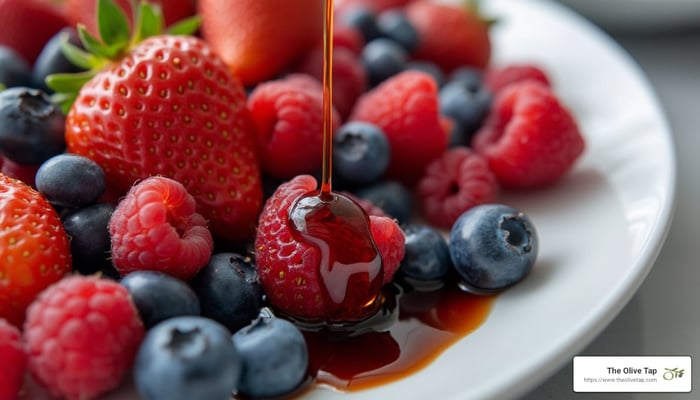
Some people have finded that balsamic vinegar's benefits might extend beyond your plate to your skin. The antimicrobial properties, acetic acid, and those wonderful antioxidants might help improve complexion over time. But I should caution you – this isn't something to dive into without some care.
DIY glow-up (diluted!)
If you're curious about trying balsamic vinegar as part of your skincare routine, proceed with gentle caution. Always start with a patch test on a small area of skin to make sure you don't have a reaction. Never apply it straight from the bottle – dilute it significantly (at least 1 part vinegar to 4 parts water).
For an extra antioxidant boost, you might try combining your diluted vinegar with some cooled green tea. And practical tip: choose clear vinegars rather than dark balsamic for skincare to avoid any temporary staining. Always rinse thoroughly after application.
I should emphasize that if you have sensitive skin, it's best to skip topical application altogether. And regardless of your skin type, checking with a dermatologist before trying any new skin treatment is always the wisest approach.
The manganese in balsamic vinegar is another unsung hero in the antioxidant story. This mineral plays a key role in producing an enzyme called superoxide dismutase, which is one of your body's primary antioxidant defenders. So even beyond the polyphenols, balsamic offers multiple layers of antioxidant support.
The simplest way to enjoy these benefits? Try a light drizzle of quality balsamic over fresh berries. The sweet-tart combination not only tastes heavenly but combines the antioxidants from both the vinegar and the fruit for a double dose of free-radical fighting power.
Potential Risks, Side-Effects & Who Should Skip
As wonderful as balsamic vinegar healthy benefits can be, it's not the perfect condiment for everyone. Like that friend who's delightful in small doses but overwhelming when they overstay their welcome, balsamic vinegar comes with a few cautions worth knowing about.
For those with acid reflux or GERD, balsamic vinegar can sometimes be that uninvited party guest who stirs up trouble. The natural acidity might trigger uncomfortable symptoms, causing that familiar burning sensation to flare up when you least expect it.
Your smile might suffer too. Dentists often warn that acidic foods like balsamic vinegar can gradually weaken tooth enamel over time. Think of your enamel as your teeth's protective shield – once it's worn down, it doesn't grow back.
Some people might experience throat irritation when consuming undiluted vinegar. That sharp, tangy sensation that makes balsamic so delightful in a salad can feel less pleasant when it lingers in your throat.
If you have grape allergies, you'll unfortunately need to skip balsamic altogether since it's crafted from grape must. Your body won't distinguish between the fruit and its fermented form.
Those taking certain medications should exercise caution too. The acidity in balsamic vinegar might interact with some medications, particularly diuretics, potentially affecting how well they work.
Expectant mothers often wonder about food safety. While moderate amounts of balsamic vinegar are generally considered safe during pregnancy, excessive consumption hasn't been thoroughly researched. As with many foods during pregnancy, moderation is key.
Most health experts suggest limiting consumption to about 2 tablespoons or less daily. This amount lets you enjoy the flavor and potential benefits while minimizing any possible downsides.
Mitigation tips
You don't have to give up your beloved balsamic entirely if you're concerned about these effects. A few simple habits can help you enjoy it more safely.
Try diluting your vinegar rather than using it straight. Mixing with olive oil creates not just a delicious dressing but also buffers some of the acidity. Always consume balsamic with food rather than on its own – this helps neutralize the acid and reduces potential irritation.
After enjoying a meal with balsamic vinegar, a quick water rinse helps protect your tooth enamel. Swishing water around your mouth helps neutralize acids and wash away residue before it can do damage.
If you're sipping any beverage containing vinegar (like a shrub or tonic), using a straw bypasses most of your teeth, reducing enamel exposure. And contrary to what might seem logical, wait at least 30 minutes before brushing after consuming acidic foods – brushing immediately can actually damage temporarily softened enamel.
If you notice persistent digestive discomfort, increasing tooth sensitivity, or other issues after enjoying balsamic vinegar, it might be worth reducing your intake or having a chat with your healthcare provider about whether it's right for you.
Even the healthiest foods aren't perfect for everyone. Listening to your body's response is always the wisest approach to any dietary choice.
Choosing Quality: Traditional vs. Commercial
Not all balsamic vinegars offer the same health benefits. Traditional balsamic vinegar from Modena, Italy (Aceto Balsamico Tradizionale di Modena) is produced under strict regulations and aged for years in wooden barrels using the Solera system, where vinegars of different ages are blended.
Think of traditional balsamic as the difference between fast food and a home-cooked meal prepared with love. The highest quality bottles carry PDO (Protected Designation of Origin) or IGP (Protected Geographical Indication) labels – these aren't just fancy stickers, but guarantees of authenticity and traditional production methods that have been perfected over generations.
When you drizzle authentic balsamic vinegar on your food, you're enjoying something that's been patiently crafted. During the aging process, which can last 12-25+ years, something magical happens: grape must sugars transform into beneficial acetic acid, polyphenols become more concentrated, and flavors develop incredible complexity while water evaporates to create that signature syrupy texture.
By contrast, many grocery store varieties are produced quickly with shortcuts that might save money but sacrifice health benefits. These commercial versions often contain added sugars, caramel coloring, and thickeners – they might look similar, but they typically contain fewer of the beneficial compounds found in traditionally aged varieties.
The wooden barrels used in traditional aging aren't just storage containers – they're active participants in creating balsamic's health profile. Different woods (oak, cherry, juniper, mulberry, chestnut) each impart unique flavors and potentially beneficial compounds. This wood-cask complexity simply can't be replicated in industrial steel tanks.
Reading the label
Becoming a savvy balsamic shopper is easier than you might think. When you pick up a bottle, first check the ingredients list – authentic balsamic vinegar healthy options contain only grape must and wine vinegar. Nothing else.
If you see "caramel color," "caramel," or "sugar" listed, you're holding a lower-quality product that likely won't deliver the same health benefits. The price is another clue – real traditional balsamic vinegar is relatively expensive due to the lengthy aging process and limited production.
Good balsamic should have a certain heft to it – when you pour it, quality balsamic will coat a spoon rather than run off like water. This viscosity indicates proper concentration of beneficial compounds.
At The Olive Tap, we're passionate about connecting you with authentic, high-quality balsamic vinegars from artisan producers. We believe that when it comes to health benefits, the real thing matters – which is why we carefully select products that deliver maximum flavor and nutritional value in every drop.
Storage & Shelf-Life Tips
Preserving those wonderful balsamic vinegar healthy benefits doesn't require complicated storage methods. In fact, balsamic vinegar is quite content sitting in your pantry, away from the hustle and bustle of your refrigerator.
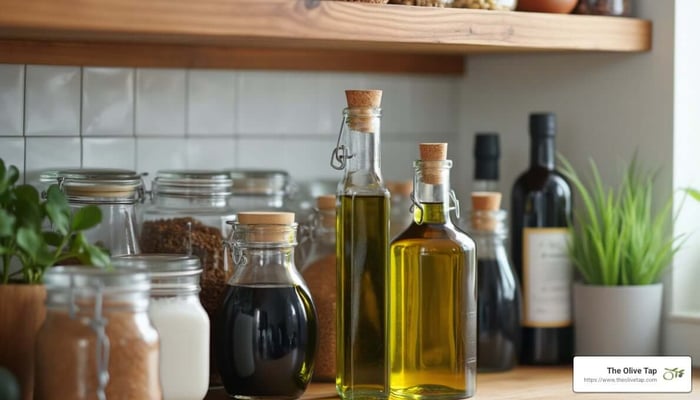
Think of your balsamic vinegar as a bit of a homebody. It prefers the quiet comfort of a cool, dark pantry over the bright light of your kitchen counter or the chill of your refrigerator. The original dark glass bottle isn't just for looks—it actually serves as a protective shield against light that could degrade those precious antioxidants and flavor compounds.
Always make sure to tighten the cap securely after each use. Balsamic vinegar might be friendly to your health, but it's not so friendly with air exposure, which can gradually alter its delightful flavor profile. And while you're finding that perfect spot in your pantry, keep it away from your stove or sunny windows. Heat is another element that can compromise quality over time.
Interestingly, refrigeration isn't balsamic's friend. The cold temperatures actually slow down the natural aging process and can affect the vinegar's texture. Room temperature storage allows it to continue developing subtle complexity—even after it's bottled.
One often overlooked storage tip: keep your balsamic away from strong-smelling foods. Like a curious neighbor, balsamic vinegar can absorb other scents over time, which might interfere with its own distinctive aroma.
When stored properly, your bottle of balsamic is remarkably patient—waiting 2-5 years without complaint. Premium traditional balsamics can actually continue improving with age, developing deeper, more complex flavors as time passes.
Flavor-saving habit
Here's a practical tip we love at The Olive Tap: consider decanting a small portion of your balsamic vinegar into a separate bottle for everyday cooking and dressing. This simple habit means your main bottle stays sealed longer, minimizing exposure to air and light. Think of it as keeping your special reserve protected while having a working bottle for daily enjoyment.
While properly stored balsamic rarely spoils thanks to its natural acidity (which discourages bacterial visitors), do trust your senses. If you notice any unusual cloudiness, off odors, or mold growth, it's time to say goodbye to that bottle. But with these simple storage practices, your balsamic vinegar healthy addition to meals should remain vibrant and beneficial for years to come.
Easy Ways to Add Balsamic to a Healthy Diet
Incorporating balsamic vinegar healthy options into your daily meals doesn't have to be complicated. Here are some simple, delicious ways to enjoy its benefits:
- Classic vinaigrette: Mix 3 parts olive oil with 1 part balsamic vinegar, add herbs and a pinch of salt for a simple dressing
- Fruit improver: Drizzle a small amount over strawberries, peaches, or melon to bring out natural sweetness. Try this recipe - Spinach Salad w/Strawberry Lime Vinaigrette.
- Meat marinade: Combine with herbs, garlic, and a touch of olive oil for tenderizing and flavoring proteins
- Vegetable roaster: Toss vegetables in a light balsamic coating before roasting for caramelized goodness
- Yogurt swirl: Add a teaspoon to plain Greek yogurt with berries for a tangy-sweet breakfast
- Cheese companion: Drizzle aged balsamic over fresh mozzarella or parmesan for an neat appetizer
- Soup finisher: Add a splash just before serving to brighten flavors in vegetable or bean soups
- Egg improver: A few drops on avocado toast with eggs adds depth without extra calories
- Dessert drizzle: Use a reduced balsamic glaze over vanilla ice cream or panna cotta
The Olive Tap offers a variety of flavored balsamic vinegars that can expand these options even further. Their Maple Bourbon, Dark Chocolate, or Raspberry balsamic vinegars can be used to create unique flavor combinations while maintaining health benefits.
5-Minute Recipe Ideas:
- Caprese Revival: Layer tomatoes, fresh mozzarella, and basil, then drizzle with balsamic vinegar and olive oil
- Balsamic Berry Parfait: Layer Greek yogurt with mixed berries and a light balsamic drizzle
- Instant Bruschetta: Top whole grain toast with diced tomatoes, basil, and a splash of balsamic
- Power Bowl Boost: Add a teaspoon to any grain bowl for flavor improvement
- Hydration Helper: Add a splash of fruit-infused balsamic to sparkling water for a refreshing, low-calorie beverage
Frequently Asked Questions about Balsamic Vinegar
Does heating destroy the health compounds?
When you're simmering that balsamic reduction or adding a splash to your hot pan, you might wonder if you're cooking away all the goodness. The good news? While some heat-sensitive compounds may take a hit during cooking, many of the beneficial components in balsamic vinegar are surprisingly resilient.
The acetic acid – that tangy backbone of vinegar's health benefits – remains stable during cooking. Many of the polyphenols (those powerful antioxidants) can also withstand moderate heat without breaking down. In fact, when you create a balsamic reduction, you're actually concentrating some of these beneficial compounds as the water evaporates.
That said, for the absolute maximum benefit, try to include some unheated balsamic in your routine too. A drizzle on your salad or fresh strawberries ensures you're getting the complete spectrum of health-promoting compounds exactly as nature intended them.
Can I drink balsamic vinegar straight?
While those rich, complex flavors might be tempting, drinking balsamic vinegar straight isn't the best idea. The high acidity can be harsh on your throat and esophagus – not to mention potentially damaging to your tooth enamel over time.
Instead, try these gentler approaches:
Dilute 1-2 teaspoons in a full glass of water if you're after the health benefits in beverage form. Some people enjoy this as a pre-meal ritual, especially with a touch of honey for balance. Mix it with olive oil and herbs for its intended culinary purpose – those health benefits will still be there, but with better flavor and less risk. Always consume with food to help buffer the acidity.
If you're particularly interested in the health benefits of drinking vinegar, it's worth checking with your healthcare provider first. This is especially important if you have any digestive conditions like acid reflux or if you take medications that might interact with acidic foods.
How much balsamic vinegar is safe per day?
When it comes to enjoying balsamic vinegar healthy benefits, moderation is key. Most experts suggest limiting consumption to about 1-2 tablespoons daily. This "goldilocks" amount lets you reap the potential health rewards while minimizing any risks associated with acidity.
If you're new to incorporating balsamic vinegar into your routine, start small – perhaps just a teaspoon in your salad dressing – and gradually increase as your palate and digestive system adjust. Pay attention to how your body responds; everyone's tolerance is different.
Exceeding the recommended amount regularly might lead to enamel erosion, throat irritation, or even interference with certain medications. The health benefits of balsamic vinegar come from consistent, moderate consumption as part of a balanced diet – not from occasional large doses.
Think of balsamic vinegar as a supporting actor in your healthy eating story – it improves the overall performance without needing to steal the show. A drizzle here and there throughout your week can contribute to your wellness goals while delighting your taste buds at the same time.
Conclusion
I've spent years exploring specialty foods, and I can tell you with confidence: balsamic vinegar's healthy benefits are the real deal. This isn't just another trendy super-food – it's a time-tested culinary treasure that genuinely supports your well-being while making your meals taste amazing.
What makes balsamic vinegar truly special is how it bridges the gap between "good for you" and "good to eat." Unlike those health foods you force yourself to consume (we've all choked down a wheat grass shot or two!), balsamic vinegar actually makes nutritious foods more delicious. A splash on roasted vegetables or fresh berries transforms simple ingredients into something spectacular.
The science backs up what Italian grandmothers have known for centuries. Those polyphenols and that acetic acid really do support heart health, help regulate blood sugar, and may even help with weight management – all while delivering rich, complex flavor with minimal calories. At just 14 calories per tablespoon, it's a flavor powerhouse that won't derail your healthy eating efforts.
But quality matters enormously. Those inexpensive supermarket bottles with caramel coloring and added sugars simply can't deliver the same benefits as traditionally produced balsamic. Think of it like coffee or wine – the real thing offers a completely different experience than the mass-produced version.
Moderation remains important, of course. A couple of tablespoons daily gives you those wonderful health benefits while respecting your tooth enamel and digestive system. It's about consistency rather than quantity – making balsamic a regular part of your meals rather than occasionally drowning your salad in it.
The Olive Tap's collection stands out even among premium balsamic vinegars. Their relationships with award-winning artisan producers ensure you're getting authentic, additive-free products with maximum flavor and health benefits. I've personally found that their aged balsamic vinegars have a complexity and richness that make even simple dishes feel special.
Whether you're drizzling it over caprese salad, using it in a marinade for chicken, or creating a sophisticated reduction for strawberries, balsamic vinegar deserves a prime spot in your pantry. It's one of those rare foods where the healthier choice is also the more delicious one.
If you have specific health concerns, it's always wise to check with your healthcare provider before making dietary changes. But for most of us, incorporating quality balsamic vinegar into our meals is simply one of the easiest and most pleasurable ways to support our health while making every bite more enjoyable.

